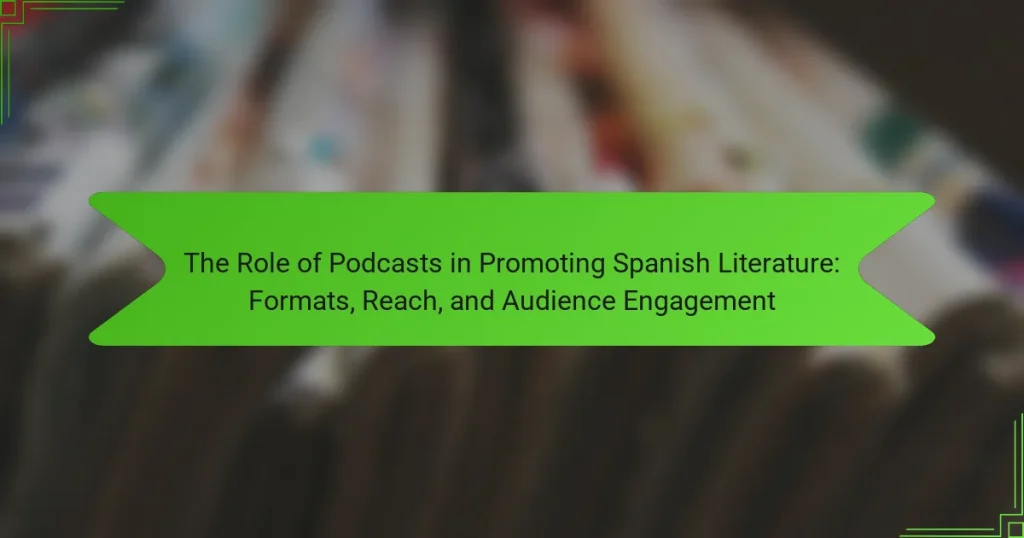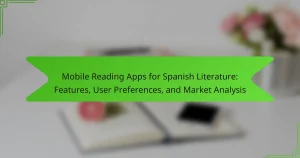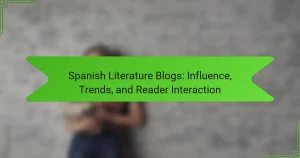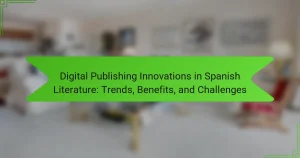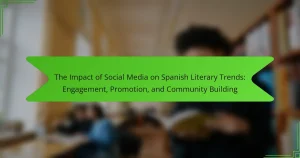Podcasts play a crucial role in promoting Spanish literature by enhancing visibility and fostering audience engagement. They offer accessible formats for exploring literary themes and author insights. This medium enables community-building among listeners while addressing challenges such as limited reach and cultural barriers. With diverse formats and high-quality production, podcasts effectively connect younger, educated audiences to Spanish literary traditions.
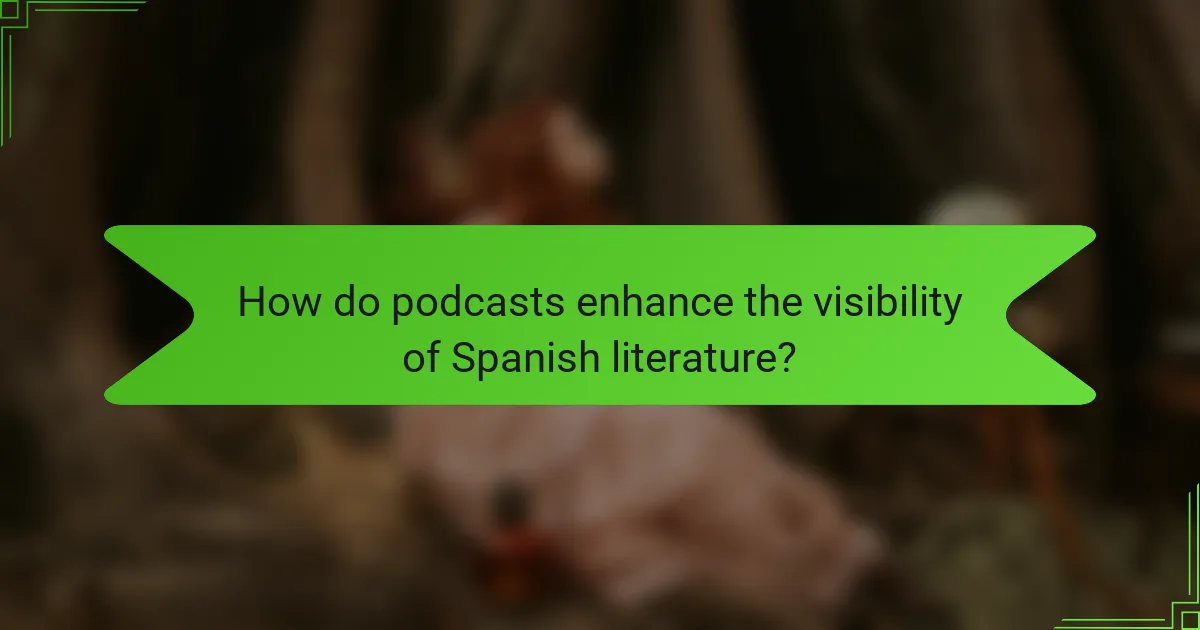
How do podcasts enhance the visibility of Spanish literature?
Podcasts significantly enhance the visibility of Spanish literature by reaching diverse audiences and fostering engagement. They provide accessible formats that allow listeners to explore literary themes, author interviews, and genre discussions.
Podcasts create a platform for emerging and established Spanish authors, increasing their exposure. This medium encourages dialogue about literary works, enriching the cultural discourse surrounding Spanish literature. As a result, listeners gain insights into the nuances of language and storytelling, promoting appreciation for Spanish literary traditions.
The interactive nature of podcasts allows audiences to connect with literature in a dynamic way, facilitating community-building among enthusiasts. This engagement can lead to increased interest in reading and exploring Spanish literature further.
What are the key formats of literary podcasts?
Literary podcasts primarily utilize formats such as interviews, narrative storytelling, panel discussions, and audio essays. These formats enhance audience engagement by providing diverse perspectives and in-depth analyses of Spanish literature. Each format serves a unique purpose, catering to various listener preferences while promoting literary appreciation.
Which platforms are most effective for promoting Spanish literature through podcasts?
Podcasts are most effective for promoting Spanish literature on platforms like Spotify, Apple Podcasts, and Google Podcasts. These platforms offer broad reach and user-friendly interfaces that enhance audience engagement. Additionally, social media platforms like Instagram and Twitter can amplify podcast visibility through targeted promotions and community interaction. Engaging content formats, such as author interviews and thematic discussions, further attract listeners.
How does audience engagement differ across regions?
Audience engagement with podcasts promoting Spanish literature varies significantly across regions due to cultural preferences and accessibility. In Latin America, podcasts are often embraced for their storytelling formats and ability to connect listeners with local authors. In contrast, European audiences may prefer more analytical discussions, reflecting a deeper literary critique.
Demographics play a crucial role; younger listeners in Spain may engage more through social media integration, while older audiences in Mexico might favor traditional narrative styles. Additionally, regional language variations influence how content resonates, with local dialects enhancing relatability.
Overall, understanding these regional differences allows creators to tailor content effectively, maximizing reach and engagement across diverse audiences.
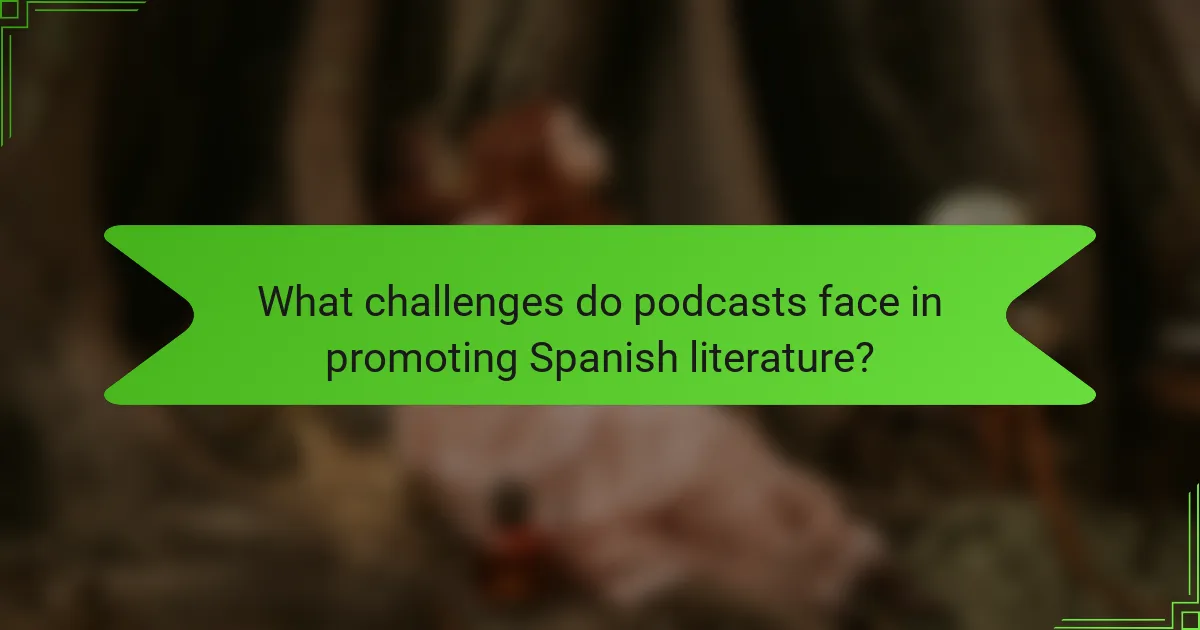
What challenges do podcasts face in promoting Spanish literature?
Podcasts promoting Spanish literature face challenges such as limited audience reach, cultural barriers, and competition with mainstream media. These factors hinder effective engagement with potential listeners. Additionally, the lack of resources and promotional strategies tailored to Spanish literature can restrict visibility and growth.
How do cultural differences impact podcast content and reception?
Cultural differences significantly influence podcast content and its reception. These variations shape themes, language, and storytelling techniques, impacting audience engagement.
Podcasts promoting Spanish literature often reflect cultural nuances, enhancing relatability. For example, regional dialects and references resonate differently across Spanish-speaking audiences. This cultural context enriches content, fostering deeper connections with listeners.
Moreover, audience expectations vary by culture. Some prefer in-depth analysis, while others favor casual discussions. Understanding these preferences enables creators to tailor their approach, maximizing impact and reach.
Finally, cultural differences affect marketing strategies. Effective promotion requires awareness of local customs and media consumption habits, ensuring podcasts reach diverse audiences successfully.
What are common barriers to entry for new podcasters in this niche?
New podcasters in the niche of Spanish literature face barriers such as limited audience reach, competition from established creators, and challenges in content production. Technical skills and marketing knowledge also present obstacles. Additionally, securing sponsorships and partnerships can be difficult without a proven track record.
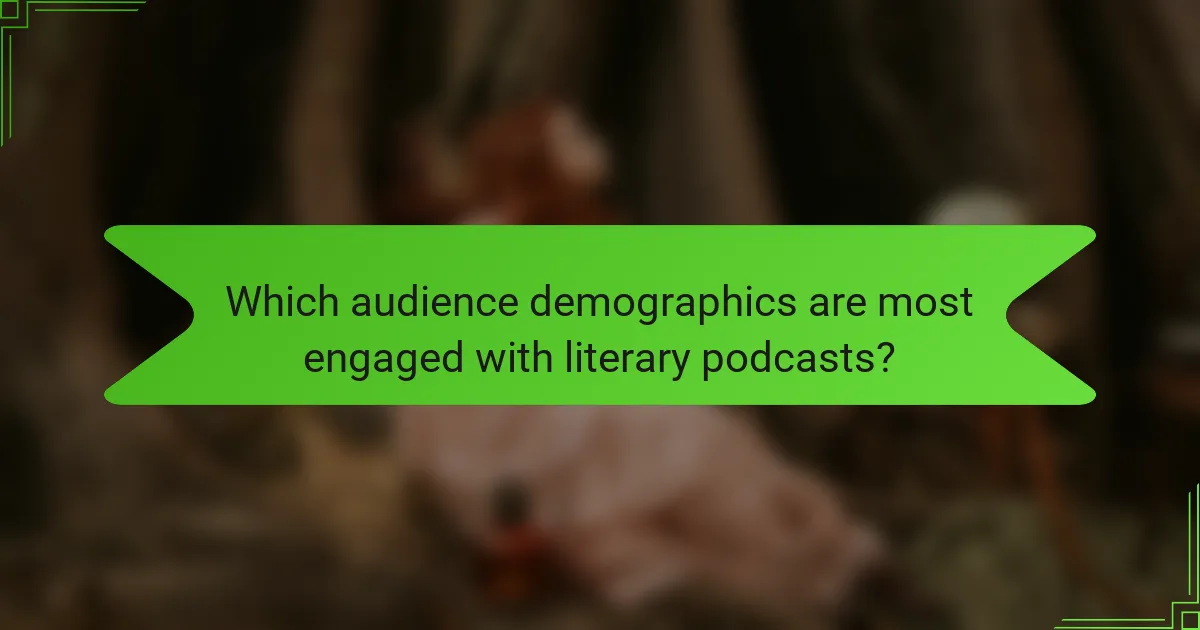
Which audience demographics are most engaged with literary podcasts?
Listeners of literary podcasts tend to be younger, educated, and culturally engaged. Specifically, demographics include individuals aged 18-34, with a significant portion holding at least a bachelor’s degree. This audience often seeks diverse perspectives and in-depth discussions on literature, particularly Spanish literature, enhancing their engagement with the content.
How do listeners’ preferences vary by region?
Listeners’ preferences for podcasts vary significantly by region, influenced by cultural, linguistic, and thematic factors. In Latin America, audiences often favor content in Spanish that reflects local traditions and contemporary issues. Conversely, in the United States, there is a growing interest in bilingual podcasts that blend English and Spanish, appealing to diverse demographics. Regional preferences also extend to podcast formats, with narrative storytelling being popular in Spain, while interviews and discussions thrive in Mexico. Understanding these regional differences enhances audience engagement and promotes Spanish literature effectively.
What role do age and education play in podcast audience engagement?
Age and education significantly influence podcast audience engagement. Younger audiences often exhibit higher engagement levels due to familiarity with digital platforms. Moreover, individuals with higher education tend to seek out niche content, including discussions on Spanish literature, enhancing their connection with relevant podcasts. This demographic diversity shapes the types of content produced, ensuring broader reach and engagement.
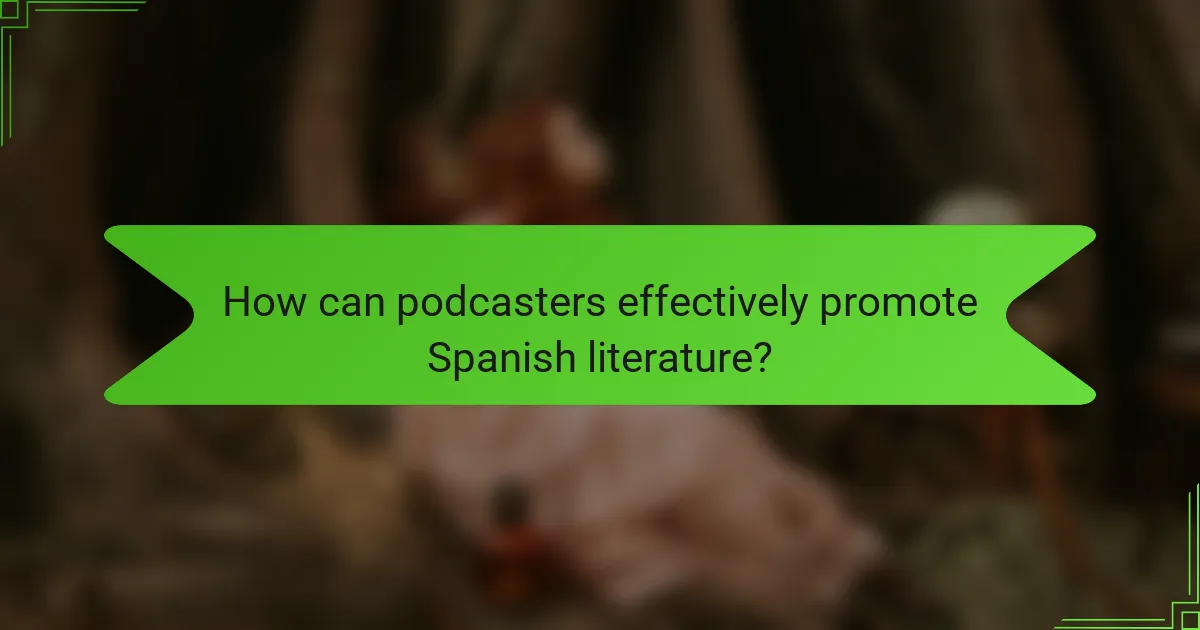
How can podcasters effectively promote Spanish literature?
Podcasters can effectively promote Spanish literature by utilizing diverse formats, engaging storytelling, and targeted outreach. They can create interviews with authors, book discussions, and thematic episodes to attract listeners.
Podcasts can reach a global audience, enhancing the visibility of Spanish literature. Engaging content fosters audience interaction through social media and listener feedback, creating a community around the literature.
Collaborations with literary influencers and participation in literary events can further amplify reach. Consistent promotion across platforms ensures sustained interest in Spanish literature.
What strategies improve listener retention and interaction?
Engaging storytelling, interactive elements, and audience participation strategies enhance listener retention and interaction. Incorporating compelling narratives from Spanish literature captivates the audience, fostering a deeper connection.
Utilizing listener polls or Q&A sessions encourages active involvement, making the audience feel valued. Additionally, consistent episode formats and thematic series create familiarity, which can boost loyalty and retention.
Promoting episodes through social media and community platforms expands reach and attracts diverse listeners, enhancing overall engagement with Spanish literature.
How do collaborations with authors and publishers enhance podcast reach?
Collaborations with authors and publishers significantly enhance podcast reach by leveraging established audiences. These partnerships create cross-promotional opportunities, allowing podcasts to tap into the existing fan bases of authors and publishers. This strategy increases visibility and credibility, attracting listeners interested in Spanish literature. Additionally, collaborative content can lead to unique episodes featuring author interviews or discussions about new releases, further engaging audiences. Such collaborations not only broaden the listener base but also foster deeper connections with the literary community.
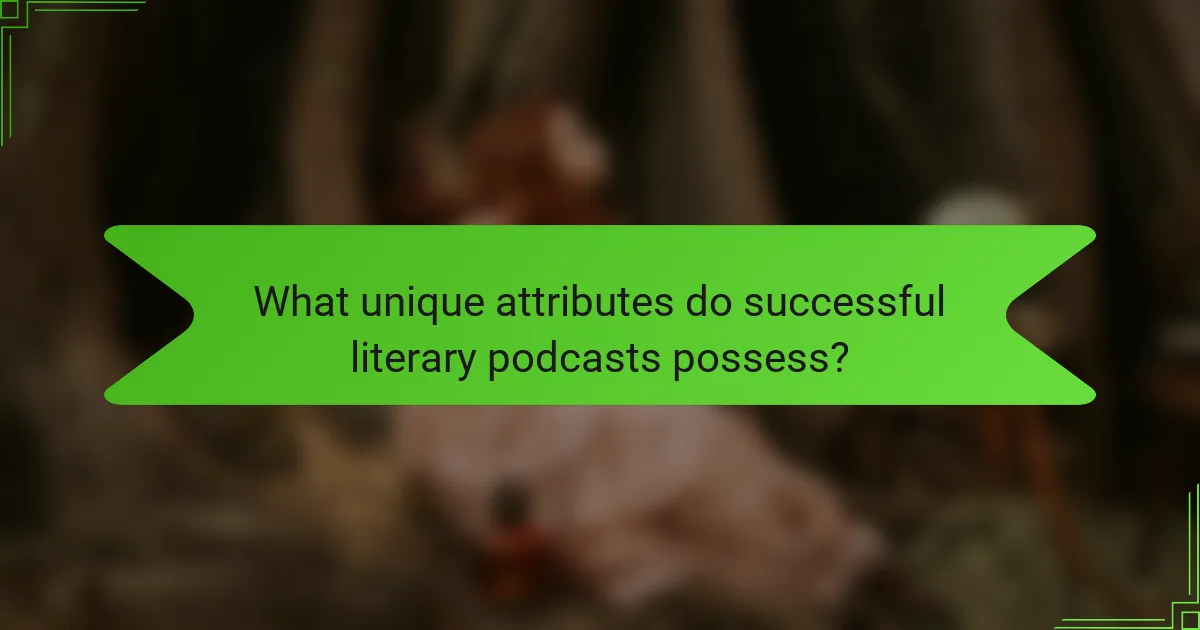
What unique attributes do successful literary podcasts possess?
Successful literary podcasts possess unique attributes that enhance audience engagement and promote Spanish literature effectively. These attributes include diverse formats, such as interviews, readings, and discussions, which cater to various listener preferences. High-quality production values are essential, ensuring clear audio and professional editing that maintain listener interest. Additionally, a focus on cultural relevance and contemporary themes connects literature to current events, making the content more relatable. Engaging hosts with strong communication skills foster a connection with the audience, encouraging loyalty and repeat listenership. Lastly, interactive elements, such as listener feedback and social media integration, promote community involvement and enhance the overall experience.
Which storytelling techniques resonate most with audiences?
Podcasts effectively engage audiences through storytelling techniques such as personal anecdotes, immersive soundscapes, and character-driven narratives. These methods create emotional connections, enhancing listener retention and interest. Utilizing diverse formats, podcasts can adapt to various audience preferences, increasing reach and engagement with Spanish literature.
How do niche topics within Spanish literature attract dedicated listeners?
Niche topics within Spanish literature attract dedicated listeners by offering specialized content that resonates with specific interests. Podcasts provide an accessible format for exploring diverse themes, styles, and authors. This engagement fosters a sense of community among listeners who share a passion for literature. Additionally, the conversational nature of podcasts enhances relatability, making complex topics more digestible. Moreover, unique attributes like author interviews and thematic deep dives enrich the listening experience, drawing in audiences seeking depth and authenticity.
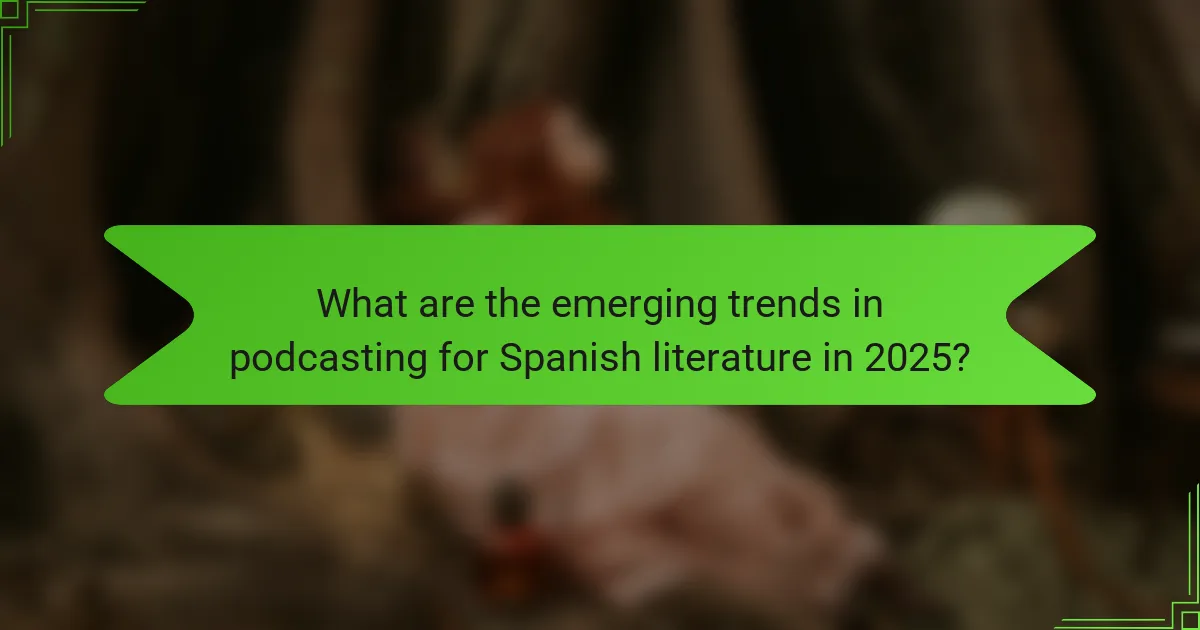
What are the emerging trends in podcasting for Spanish literature in 2025?
Podcasts are increasingly vital in promoting Spanish literature, with trends focusing on diverse formats, broader reach, and enhanced audience engagement. In 2025, interactive storytelling will gain traction, allowing listeners to engage with narratives in real-time.
Additionally, bilingual podcasts will emerge, catering to both Spanish-speaking audiences and those learning the language. Collaborations with authors and literary festivals will strengthen community ties and encourage participation.
The use of data analytics will refine content strategies, enabling creators to tailor episodes to listener preferences. Finally, niche genres within Spanish literature will find dedicated podcast platforms, fostering deeper connections with specific literary themes and audiences.
How is technology shaping the future of literary podcasts?
Technology is significantly enhancing the future of literary podcasts by improving accessibility and audience engagement. Innovations in audio quality and distribution platforms allow for a broader reach, enabling Spanish literature to connect with diverse audiences. Interactive features, such as listener feedback and social media integration, foster deeper engagement. Additionally, data analytics helps creators understand listener preferences, shaping content to better meet audience interests. These advancements position literary podcasts as vital tools for promoting Spanish literature in a competitive digital landscape.
What innovative formats are gaining traction among listeners?
Innovative podcast formats gaining traction include narrative storytelling, interview-based discussions, and serialized content. These formats enhance listener engagement and broaden the reach of Spanish literature. Narrative storytelling captivates audiences through immersive experiences, while interviews provide insights from authors and experts. Serialized content encourages ongoing engagement, as listeners anticipate new episodes, fostering a community around literary themes.
What best practices should podcasters follow to succeed in this space?
Podcasters should focus on quality content, audience engagement, and effective promotion to succeed. Consistent episode releases help build listener loyalty. Engaging storytelling captivates audiences and enhances retention. Collaborating with authors can deepen connections to Spanish literature. Utilizing social media platforms expands reach and fosters community interaction.
